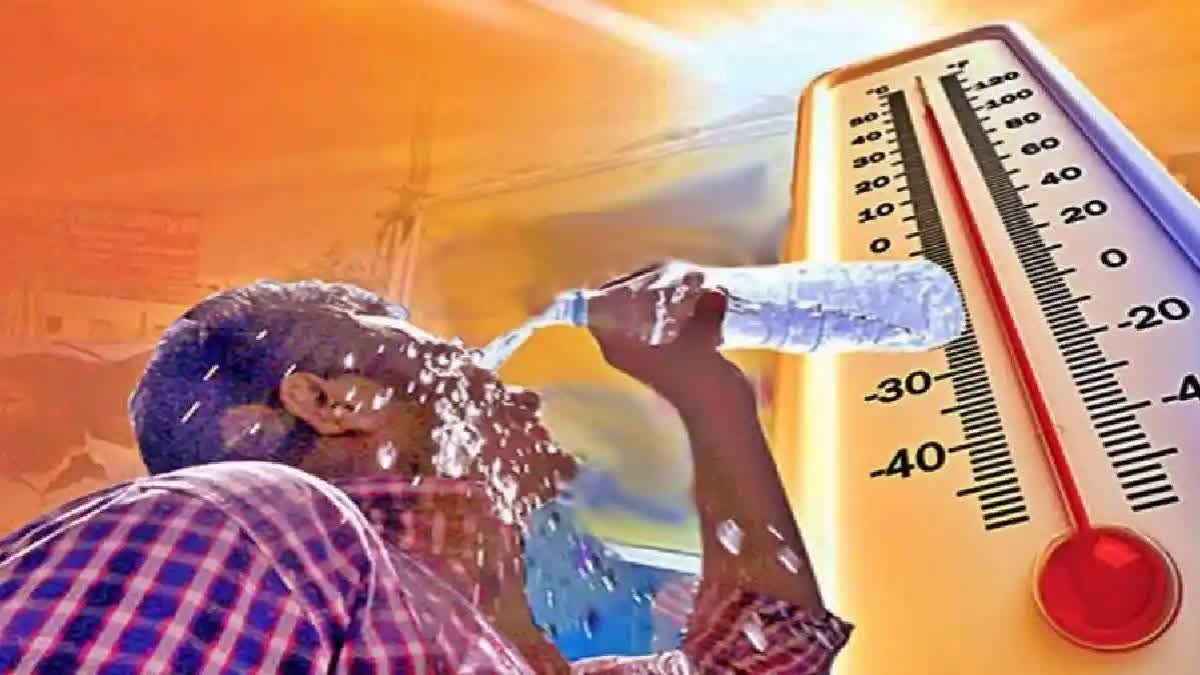Heatwave Prediction in India: Do's and Don't to Stay Safe
India is predicted to experience extreme weather conditions this year starting at the end of April. So here are the do's and don't for a heatwave, which is a period of abnormally high temperatures.


Published : Apr 1, 2024, 6:18 PM IST
Hyderabad: Union Minister for Earth Sciences Kiren Rijiju on Monday said that India is predicted to experience extreme weather conditions this year, starting at the end of April and coinciding with the general elections, making it crucial for all stakeholders to prepare in advance.
What is a Heatwave: A Heatwave is a period of abnormally high temperatures, more than the normal maximum temperature that occurs during the summer season. If the maximum temperature of any place continues to be more than 45˚C consecutively for two days, it is a heat wave condition, Five or more consecutive days during which the daily maximum temperature exceeds the average temperature by five degrees Celsius.
Heat Wave conditions can result in physiological strain, which could even result in death.
Here are some of the do's and don't for the heatwave and the scorching summer:
Ways to prevent heat-related illness:
- Schedule outdoor activities carefully: If you must be outdoors, try to limit your activity to morning and evening hours. Try to rest often in shady areas so that your body's thermostat will have a chance to recover.
- Avoid going out in the sun, especially between 12.00 noon and 3.00 pm
- What to eat: Eat light meals, have summer fruits and other foods naturally loaded with water. One should add foods that act as body coolant to the diet
- Food with high water content like fruits (strawberries/oranges), cucumber, and lettuce will help you stay hydrated and cool
- We should avoid heavy, spicy and oily foods that can increase body heat
- Drinking plenty of fluids: Drink sufficient water as often as possible, even if not thirsty
- To prevent dehydration, drink plenty of water, fruit juice, or vegetable juice per day. Because heat-related illness can also result from salt depletion, it may be advisable to substitute an electrolyte-rich sports drink for water during periods of extreme heat and humidity.
- Use ORS, homemade drinks like lassi, rice water, lemon water, buttermilk, etc. which helps to rehydrate the body
- Don’t drink liquids that contain alcohol, caffeine, or large amounts of sugar; they may actually cause your body to lose more fluid. Also avoid very cold drinks, because they can cause stomach cramps
- Wear appropriate clothing: Wear lightweight, light-coloured, loose, and porous cotton clothes. Use protective goggles, an umbrella/hat, shoes or chappals while going out in the sun.
Guidelines when exercising:
- Avoid strenuous activities when the outside temperature is high. Avoid working outside between 12 noon and 3 pm
- While travelling, carry water with you
- If you work outside, use a hat or an umbrella and also use a damp cloth on your head, neck, face and limbs
- Replace salt and minerals
- Heavy sweating removes salt and minerals from the body. These must be replaced
- If you must exercise, drink 2–4 glasses of cool, non-alcoholic fluids each hour
- A sports beverage can replace the salt and minerals lost in sweat. If you are on a low-salt diet, talk with your doctor before drinking a sports beverage or taking salt tablets
- Keep your home cool, use curtains, shutters or sun-shade and open windows at night
- Use fans, and damp clothing and take a bath in cold water frequently
- Take care of those at risk: Visit adults at risk at least twice a day and watch them for signs of heat illness. Check on infants and young children much more often
- Never leave infants, children or pets in a parked car
- Stay cool indoors: Stay cool indoors, take frequent cool showers or a foot bath, or wet your hands, face and back of neck or use wet blankets. Use your stove and oven less to maintain a cooler temperature in your home. Try to cool the home at night. If necessary, find a cooler place than your home and spend a few hours there
- Keep the curtains/blinds at home shut during the hottest times of the day so that your home stays cool
- Pets: Provide plenty of fresh water for pets, and leave water for them in a shady area
- Watch for signs of dehydration like dry mouth, dizziness, confusion, and headache- If you feel faint see a doctor immediately
Tips for Treatment for a Person Affected by a Sunstroke:
Lay the person in a cool place, under a shade. Wipe her/him with a wet cloth/wash the body frequently. Pour normal-temperature water on the head. The main thing is to bring down the body temperature
Give the person ORS to drink or Lemon Sarbat/Torani or whatever is useful to rehydrate the body
Take the person immediately to the nearest health centre. The patient needs immediate hospitalisation, as heat strokes could be fatal





